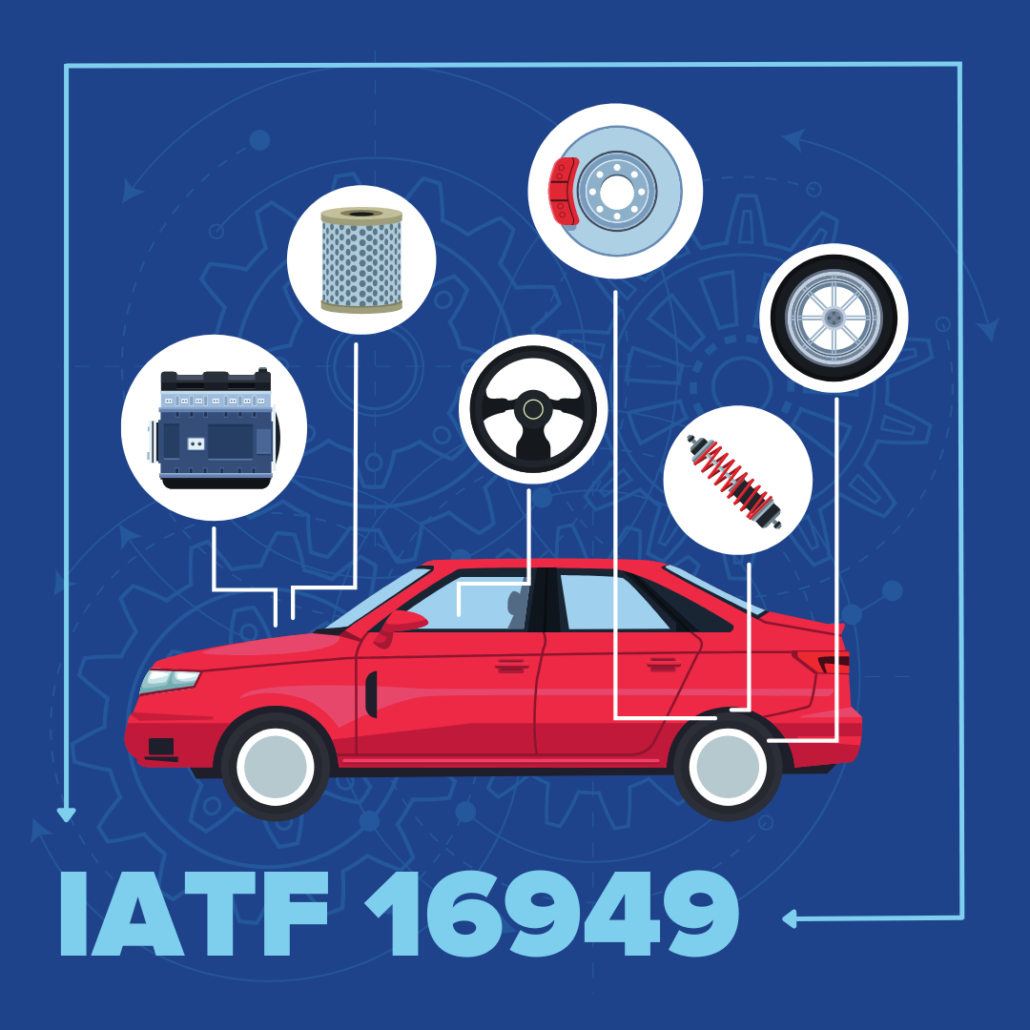
Understanding IATF 16949: A Quick Guide to Automotive Quality Management
In the ever-evolving landscape of the automotive industry, ensuring product quality and safety is paramount. One key standard that plays a crucial role in this pursuit is IATF 16949. In this article, we will delve into the intricacies of IATF 16949, exploring its significance, key elements, and benefits.
What is IATF 16949? IATF 16949, or the International Automotive Task Force 16949, is a globally recognized quality management standard specifically designed for the automotive sector. This standard is based on ISO 9001 and incorporates additional requirements tailored to the automotive industry. IATF 16949 was developed by the International Automotive Task Force (IATF) to promote quality, consistency, and continual improvement throughout the automotive supply chain.

Key Elements of IATF 16949:
- Customer Focus: IATF 16949 places a strong emphasis on meeting and exceeding customer requirements. This includes understanding customer needs, providing defect-free products, and consistently delivering high-quality services.
- Process Approach: The standard adopts a process-oriented approach to quality management. Organizations are encouraged to identify, manage, and optimize key processes to enhance efficiency and effectiveness in meeting objectives.
- Risk Management: IATF 16949 requires organizations to identify and address potential risks within their processes. This proactive approach helps in preventing issues, ensuring product safety, and maintaining a robust quality management system.
- Supplier Quality Management: Recognizing the interconnected nature of the automotive supply chain, IATF 16949 places a significant focus on supplier quality management. Companies must work closely with their suppliers to ensure that quality standards are consistently met throughout the supply chain.
- Continuous Improvement: The standard promotes a culture of continual improvement, urging organizations to regularly assess and enhance their processes. This commitment to ongoing refinement helps companies stay ahead in a competitive market.
Benefits of Implementing IATF 16949:
- Global Recognition: Achieving IATF 16949 certification provides organizations with global recognition, enhancing their credibility and opening doors to new business opportunities.
- Improved Efficiency: By adopting the standard’s process-oriented approach, organizations can streamline their operations, reduce waste, and enhance overall efficiency.
- Enhanced Customer Satisfaction: Meeting IATF 16949 requirements ensures that products and services consistently meet or exceed customer expectations, leading to higher satisfaction levels.
- Risk Mitigation: The focus on risk management helps organizations identify potential issues before they escalate, reducing the likelihood of defects and recalls.
- Competitive Advantage: IATF 16949 certification provides a competitive edge in the automotive industry. Many OEMs (Original Equipment Manufacturers) prefer working with suppliers who adhere to this globally recognized standard – and many companies are required to comply.
RELATED: Buyer’s Guide: Selecting a Requirements Management and Traceability Solution for Automotive
Who is required to comply with IATF 16949?
Companies that are part of the automotive supply chain, including manufacturers, suppliers, and service providers, may be required to comply with IATF 16949. This includes organizations involved in the production of automotive parts, components, and assemblies.
Key stakeholders in the automotive industry, such as original equipment manufacturers (OEMs) and their suppliers, often seek IATF 16949 certification to demonstrate their commitment to quality and compliance with industry standards. Certification to this standard is often a prerequisite for becoming a supplier to major automotive companies.
It’s important for organizations in the automotive sector to assess their specific contractual requirements and the expectations of their customers to determine whether compliance with IATF 16949 is necessary for their business. Certification to IATF 16949 is typically achieved through a third-party audit process conducted by accredited certification bodies.
What is a Quality Management System?
A Quality Management System (QMS) is a comprehensive framework of policies, processes, procedures, and records that an organization establishes and maintains to ensure its products or services consistently meet or exceed customer expectations. The primary goal of a QMS is to enhance customer satisfaction by consistently delivering high-quality products or services while also meeting regulatory requirements. It encompasses various elements such as quality planning, control, assurance, and improvement. A well-implemented QMS helps organizations identify and document their processes, set quality objectives, and monitor performance against these objectives. It often involves the use of standardized methodologies, documentation, and quality tools to foster a systematic approach to quality management, ensuring that every stage of the product or service lifecycle is controlled, measured, and continually improved upon. Certification to internationally recognized QMS standards, such as IATF 16946 and ISO 9001, provides external validation of an organization’s commitment to quality and can enhance its credibility in the marketplace.
RELATED: Traceable Agile™ – Speed AND Quality Are Possible for Software Factories in Safety-critical Industries
How can Jama Connect® help?
Jama Connect® is a powerful tool that plays a pivotal role in assisting teams in meeting the requirements of a QMS within various industries, particularly those with stringent regulatory standards.
Here are several ways in which Jama Connect facilitates compliance with QMS requirements:
- Documenting and Managing Requirements: Jama Connect provides a centralized platform for documenting and managing requirements throughout the product development lifecycle. It allows teams to create, review, and collaborate on requirements, ensuring clarity and consistency. This centralized approach enhances communication among team members, reducing the risk of misunderstandings and improving overall requirement management efficiency.
- Enabling Risk-Based Thinking: The platform supports risk-based thinking by providing tools to identify, assess, and mitigate risks associated with product development. Teams can systematically evaluate potential risks, assign risk levels, and implement mitigation strategies. This proactive approach aligns with the risk management requirements of QMS standards, contributing to safer and more reliable product development.
- Assisting with Change Management Processes: Change management is a critical aspect of QMS, and Jama Connect streamlines this process. Teams can efficiently capture and evaluate proposed changes, assess their impact on requirements and other project elements, and implement changes in a controlled manner. This ensures that changes are documented, reviewed, and tracked, promoting transparency and accountability in the change management process.
- Enabling Traceability of Processes and Products: Jama Connect offers robust traceability features, allowing teams to establish and visualize relationships between requirements, tests, and other project artifacts. This traceability is crucial for demonstrating compliance with QMS standards, as it provides a clear linkage between various stages of the development process, from initial requirements to final product validation.
- Easy Documentation for Evidence for Audits: Jama Connect simplifies the documentation process required for audits. The platform enables teams to generate comprehensive reports, traceability matrices, and documentation trails that serve as evidence of compliance with QMS standards. This facilitates smoother and more successful audits, as auditors can easily review and verify the necessary documentation.
- Supporting a Continuous Improvement Process: Continuous improvement is a fundamental principle of QMS, and Jama Connect supports this by providing analytics and insights into project performance. Teams can analyze data on requirements, testing, and other project metrics to identify areas for improvement. This data-driven approach fosters a culture of continuous improvement, aligning with the principles of QMS standards.
- Supporting a Customer Focus with Traceability to Customer Needs: Jama Connect helps maintain a strong customer focus by establishing clear traceability from requirements to customer needs. This ensures that the final product aligns with customer expectations and requirements. The platform’s traceability features provide a visual representation of how each requirement contributes to meeting customer needs, strengthening the customer-centric approach advocated by QMS standards.
IATF 16949 is a critical standard for the automotive industry, emphasizing quality management, risk mitigation, and continuous improvement. Organizations that invest in achieving and maintaining IATF 16949 certification position themselves as reliable partners in a highly competitive and demanding market, ensuring the production of high-quality automotive products.
Note: This article was drafted with the aid of AI. Additional content, edits for accuracy, and industry expertise by Matt Mickle and McKenzie Jonsson.
- 9 Strategies To Overcome Challenges In The EU Medical Device Market In 2025 And Beyond - February 6, 2025
- Leveraging Jama Connect® and Jira for Enhanced Requirements - January 30, 2025
- With Hacks on the Rise, Manufacturers Hone Their Cybersecurity Smarts - January 23, 2025